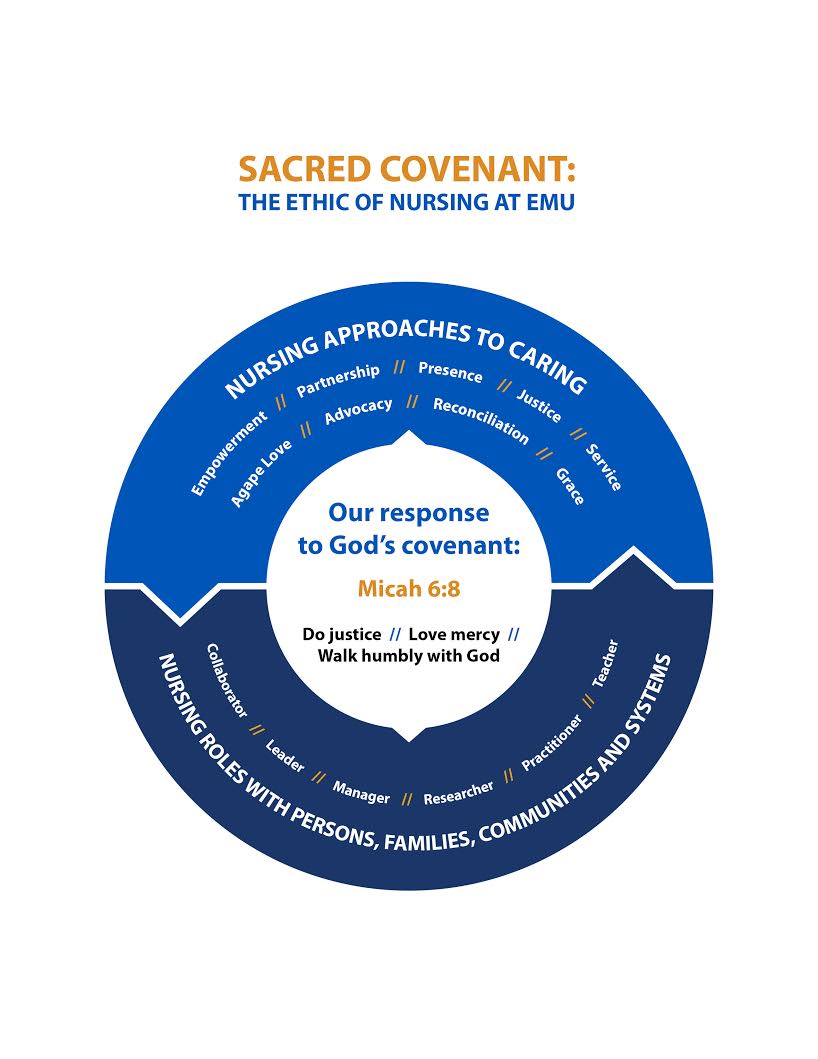EMU Department of Nursing Philosophy
The nursing program is based upon Christian Anabaptist faith beliefs, as well as the Standards for Baccalaureate Education established by the American Association of Colleges of Nursing, and is consistent with EMU’s philosophy and purposes. This philosophical statement identifies the major underpinnings for the program and the nursing department’s philosophy of education.
The discipline of nursing is concerned with how nurses interact with people in relation to their health and within their total environment. Nursing at its core is caring for people within their health experience. Persons are viewed holistically in terms of needs that vary with developmental stage and cultural background. Individuals, families, groups and communities as clients, are approached within a sacred covenant framework. Trust among partners, loyalty, responsibility, mutual obligations and unconditional faithfulness characterize a covenant relationship. Health is seen as relative and as encompassing both wellness and illness. Wholeness and healing, the goals of nursing care, are viewed from a Christian perspective. The environment is viewed as including both natural and sociocultural systems. Health care systems are especially important components of the environment. Nursing is understood by considering role functions, various processes nurses engage in, Christian Anabaptist
approaches to caring, and professional responsibilities. The discipline of nursing is thus best built upon knowledge from the natural and behavioral sciences and the liberal arts.
Preparation of the professional nurse requires the development of intellectual and affective capacities. The effective nurse is able to think critically, feel deeply, communicate clearly, interact meaningfully, assume responsibility, exhibit a thirst for knowledge and act morally.
A number of beliefs underlie the educational environment we seek to create. Foundationally, we believe that personal growth is essential for professional growth and that interdependence in a covenant relationship with faculty facilitates this growth. Growth is enhanced when teachers provide honest feedback within a supportive framework. Learning is also promoted when student involvement is increased, when students are partners in learning, when the goals of learning are clear, and when the student has the opportunity to practice the desired skills. Mastery based learning, within the covenant framework, is facilitated by faculty and students partnering together to enhance learning for students with diverse abilities. The educational experience incorporates a variety of methodologies in recognition that not one teaching method meets everyone’s learning needs.
Graduates are generalists prepared to function as beginning practitioners in a variety of settings with a focus on individuals, families, or groups of clients. They have the capacity to develop a personal art of nursing that grows from an excellent knowledge base, their own personal resources, a sense of the sacred in moments and places and a profound sense of respect for all people. Graduates are self-directed and engage in continual learning and development. Graduates have the foundation necessary to engage in graduate study. They are accountable for their own actions but work collaboratively with clients, other health team members, and communities within which they practice. As professionals, they seek to improve health care by promoting justice through involvement in church, community, political, and professional organizations and activities.
Philosophical beliefs are further clarified in the following diagrams and the list of outcomes expected of the graduate.
